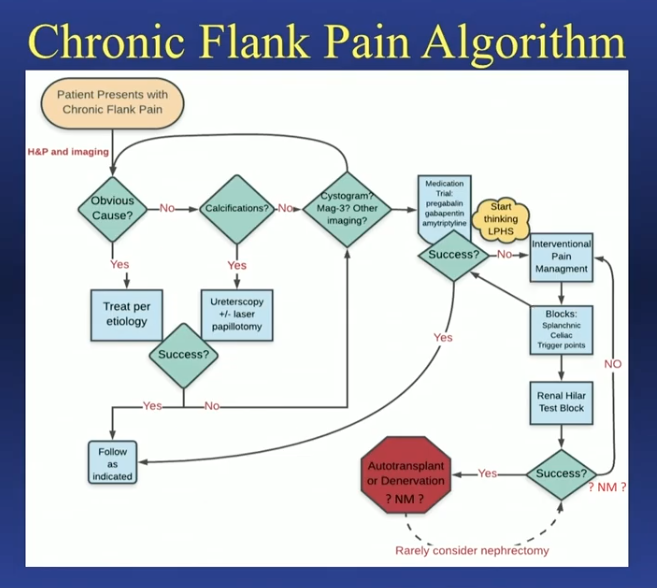Wesley A. Mayer, MD, presented “Recurrent Flank Pain: Strategies for the Successful Workup and Management of a Frustrating Clinical Conundrum” during the 23rd Annual Innovations in Urologic Practice on September 14, 2018 in Santa Fe, New Mexico.
How to cite: Mayer, Wesley A.. “Recurrent Flank Pain: Strategies for the Successful Workup and Management of a Frustrating Clinical Conundrum” September 14, 2018. Accessed Nov 2025. https://grandroundsinurology.com/the-bottom-line-practical-application-of-clinical-trial-data-to-advanced-renal-cell-carcinoma/
Recurrent Flank Pain: Strategies for the Successful Workup and Management of a Frustrating Clinical Conundrum – Summary:
Wesley A. Mayer, MD, presents a framework for diagnosis and treatment of chronic flank pain, identifying common and uncommon causes. He discusses papillary calcifications, Loin Pain Hematuria Syndrome, polycystic kidney disease, and treatment approaches such as renal denervation and renal autotransplant.
Abstract:
Chronic flank pain can be a frustrating clinical entity both for patients and urologists. Most patients presenting with flank pain have one of many common and identifiable etiologies, such as ureteral obstruction, infection, or cancer. However, choosing an approach for a patient with severe chronic flank pain without an obvious etiology on imaging can be challenging.
If the patient has small calcifications on CT scan, these could be the result of papillary calcifications, which, for example, could be from medullary nephrocalcinosis or medullary sponge kidney. These calcifications could also be due to Randall’s plaques, or small caliceal stones. Though traditionally, one may think these calcifications wouldn’t be the source of significant pain, data does support laser papillotomy of papillary calcifications and/or the removal of small calyceal stones.
For patients with polycystic kidney disease, one can use a stepwise approach of increasing treatment invasiveness. Ultimately, clinicians may need to utilize therapies like nerve blocks, renal denervation, cyst decortication, and even nephrectomy in these cases.
This presentation reviews Loin Pain Hematuria Syndrome, including the diagnostic and therapeutic framework. Additionally, the discussion covers renal autotransplant and methods to predict success. Finally, an algorithm is proposed for treating this difficult patient population.
About Innovations in Urologic Practice
Innovations in Urologic Practice (IUP) is an annual CME-accredited conference devoted to updating urologists on the rapidly changing healthcare environment. Topics focus on innovative diagnostic and treatment strategies, controversies, new and currently developing technologies, and challenges in today’s urologic practice. Dr. Mayer presented this lecture during the 23rd IUP in 2018. Please visit this page in order to learn more about future IUP meetings.
ABOUT THE AUTHOR
Wesley A. Mayer, MD, is an associate professor of urology, the vice chair for education of the Scott Department of Urology, and an assistant dean of graduate medical education at Baylor College of Medicine in Houston, Texas. Dr. Mayer earned his medical degree from Baylor College of Medicine, graduating with highest honors. He completed his internship in general surgery and his urology residency at the University of Pennsylvania in Philadelphia, Pennsylvania. Dr. Mayer is fellowship-trained in advanced robotic, laparoscopic, and endoscopic surgery in Baylor College of Medicine’s Scott Department of Urology.
Dr. Mayer specializes in advanced minimally invasive surgical treatments for urologic diseases including robotic, laparoscopic (including single-site), endourologic, and percutaneous surgery. He has a special interest in kidney cancer, kidney stones, upper urinary tract reconstruction, adrenal masses, and transplant urology. He has also published research and has been invited to speak on these topics at several national and international conferences. Dr. Mayer has been repeatedly selected as a “Top Urologist in Houston, Texas” in The Leading Physicians of the World and a “Top Doc” in Houstonia Magazine.


